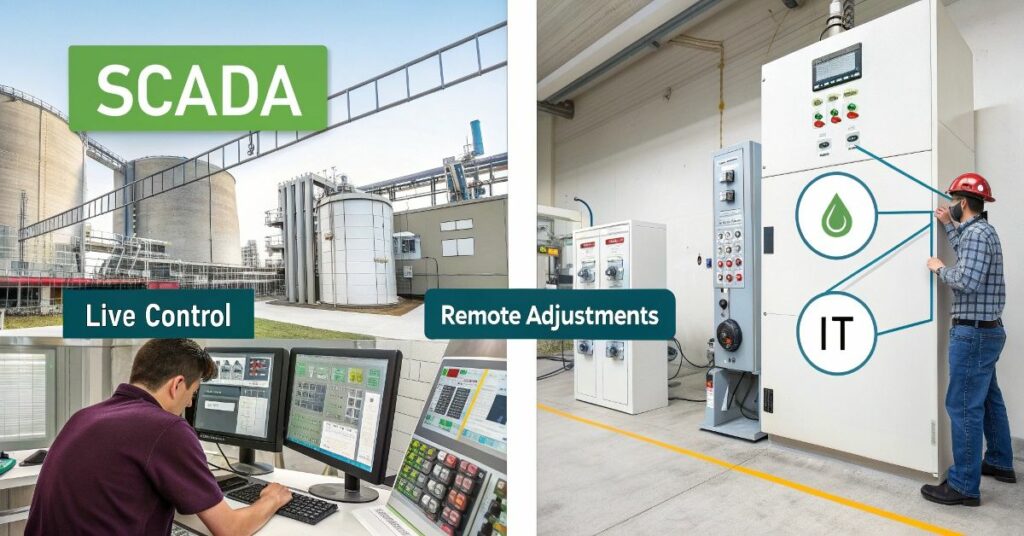
SCADA (Supervisory Control and Data Acquisition) operates as an industrial monitoring and control system that manages diverse industrial operations. Manages both natural operations such as water plant operations together with industrial systems which manage electrical grids. The collection process of systems involves sensors that deliver information to operators who maintain system operational efficiency.
The initial appearance of SCADA complexity makes it difficult at first yet acquiring knowledge becomes much simpler than you expect. The appropriate resources enable newcomers to understand standard operations and begin operating the system.
Your understanding of systems will improve if you possess any experience in technology or engineering. Basic technical understanding is needed yet users can access user-friendly interfaces in addition to basic training materials available through many systems.
What Makes SCADA Different from Other Systems?

The primary purpose of SCADA systems exists to deliver real-time management and control for industrial processes. General computer systems differ because they directly communicate through sensors and manufacturing devices. The system operates continuously to transmit data to operators who then gain the capability to make instant decisions that guide remote adjustments in operations.
Traditional IT networks and other systems place their emphasis on data storage or processing functions. The primary goal of SCADA includes acquiring live monitoring data which immediately provides operators with feedback. enhances operational efficiency through automated remote control and management of power plants and water systems but most monitoring systems still depend on human intervention for adjustment needs.
Key Challenges in Learning SCADA

Fitting into the realm of requires substantial difficulty for new learners because of the system’s complex technology. The main hurdle in understanding hardware integration with software exists. SCADA systems need to connect with physical devices through sensors which requires understanding how the system interacts with the equipment along with the program software. Learning poses difficulties to those without expertise in information technology.
Other challenges include:
- People need to comprehend the complex terms and procedures that make up SCADA systems.
- Knowledge of the programming and scripting languages that appear in configuration processes.
- The access to real SCADA software and hardware systems remains challenging to find.
- System troubleshooting demands both problem-solving capabilities and patient behavior to resolve errors.
Does SCADA Require Specialized Knowledge or Skills?
Special technical understanding along with specific competencies are necessary for working with systems. To understand the field properly one needs both hardware and software patterns knowledge. To work with systems you need understanding of physical devices particularly sensors and machinery since these form part of the infrastructure.
The ability to understand basic programming as well as networking concepts supports successful work with SCADA. Computer scripts form an essential part of systems when operators need to automate their operations and resolve technical issues.
Common Obstacles for Beginners in SCADA

Novice users experience difficulties when studying SCADA system technical concepts. The learning process of systems becomes complicated because they use software combined with hardware elements. Starting users encounter difficulty while establishing device interconnections and they face trouble configuring parameters and correctly reading system data.
Systems under SCADA management need exclusive access to unique equipment and software platforms which users might not already possess. Operating a system without practical experience makes it challenging to understand proper troubleshooting techniques and system performance enhancement methods. The excessive complexity of the system leads beginners to experience confusion when trying to determine their first course of action.
Can SCADA Be Self-Taught or Does It Need Formal Education?
The process of learning SCADA through self-study becomes possible using appropriate resources. Beginners interested in learning can access numerous online courses plus tutorials together with books to learn at their convenience. Practice together with dedication enables you to understand the basics so you can begin working with the system.
Organized programs of instruction using expert knowledge constitute the service offering from educational institutions. Enrollment in a formal course combined with degree programs provides. People must get formal education to fulfill employment requirements in businesses with specific certification standards.
Here’s a simple comparison:
| Self-Taught Approach | Formal Education Approach |
| Flexible learning pace | Structured learning path |
| Low cost (many free resources) | Higher cost (tuition fees) |
| Requires self-discipline | Offers expert guidance |
| Focus on basics and practice | Comprehensive and advanced knowledge |
How Steep Is the Learning Curve in SCADA?

Novice students face a difficult learning schedule when starting to work with SCADA systems due to their unfamiliarity with industrial systems and programming. Learning spans multiple levels including hardware-software relations and detailed mastery of particular tools alongside their software elements. The steepness of learning becomes apparent when beginners attempt to understand its technical language and operational procedures.
The speed of learning depends on each individual case the most with technology or engineering background making it quicker for certain people. Learning SCADA depends on mastering concepts alongside practical work experience that increases your speed of comprehension. You will master the technical skills through initial learning difficulties because practice makes them instinctive with time.
Final Verdict: Is SCADA Really Hard to Learn?
Students discovering SCADA must overcome difficulties although they can master this system successfully. Learning poses difficulties to novices who need to master both software solutions and hardware skills at once. Approaching basics one by one helps beginners to handle this field more efficiently. Online tutorials together with practice alongside appropriate resources enable any person to begin studying.
Learning requires background experience and the amount of time you dedicate to the process. Wetware technicians might master it quicker than others who need longer to understand specific concepts. Most individuals who dedicate time to learn alongside persistence can successfully master the content even though it demands patient work.
FAQ’s
Learning SCADA poses difficulty to beginners who are new to the field?
New users find SCADA programming complex because it combines requirements for both software programming skills and hardware understanding. Long-term practice allows students to understand systems better.
Is formal education required to get a job in SCADA?
Formal education helps, but it’s not always required. In addition to hands-on experience, employers value practical skills as well.
What is the duration needed to acquire knowledge of SCADA?
Learning SCADA takes diverse time lengths based on your background experience as well as your study commitment level. After consistent study and practice the fundamental concepts can be learned within a few months.
Conclusion
The learning of SCADA presents initial difficulty yet becomes attainable by adopting proper study methods. Practicing smaller parts of software and hardware information combined can help you deal with the overwhelming nature of this knowledge. Regardless of independent learning or official enrollment you need to practice repeatedly to achieve expertise.
The learning process for SCAD system management becomes progressively easier over time when you have experience with electronics or programming. Your valuable skills in efficient monitoring and control system operations will be essential for industries that depend on such systems despite difficult learning phases.

